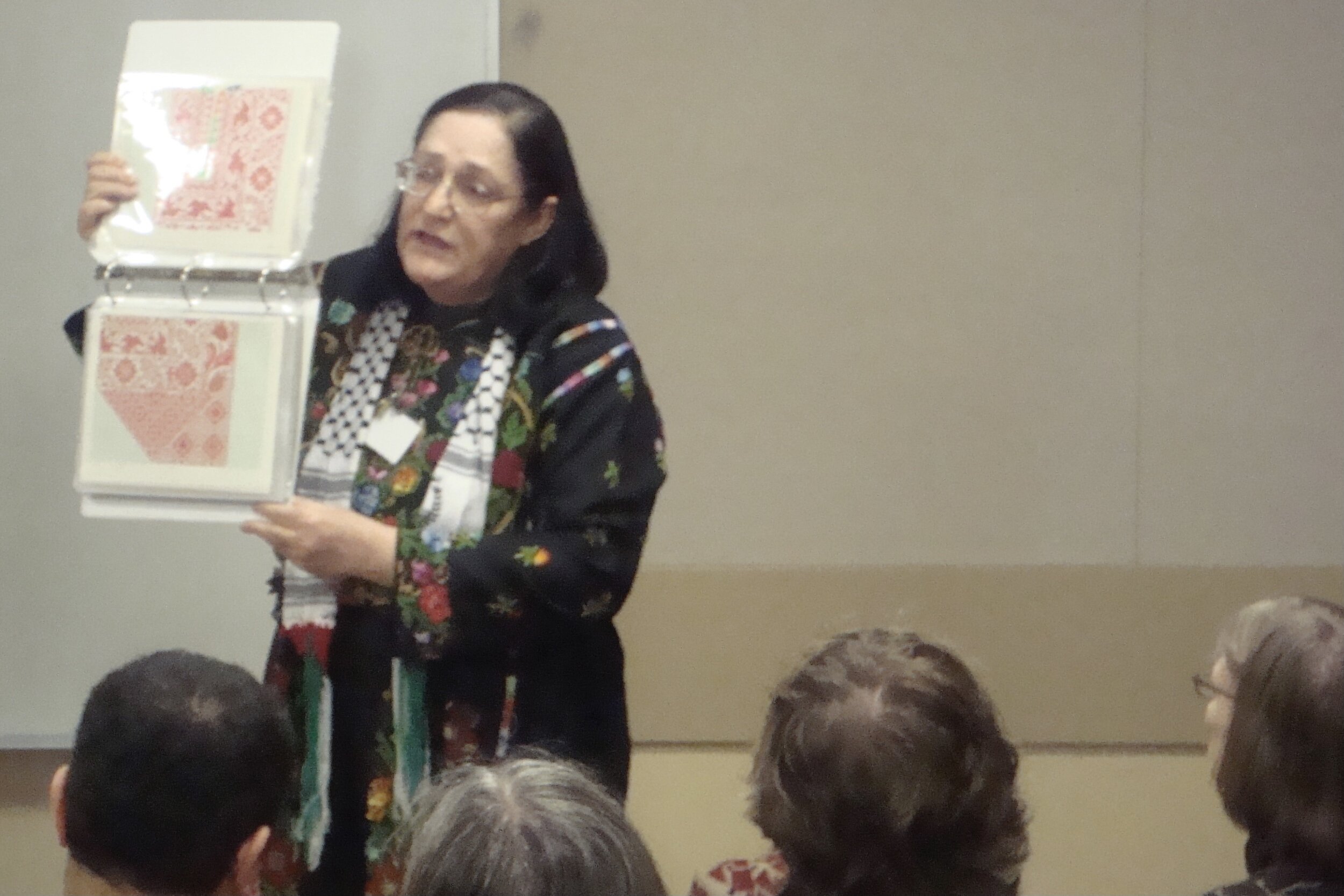About Feryal Abbasi-Ghnaim
Teaching at Damascus University, Damascus, Syria (1970s)
Feryal Abbasi-Ghnaim was born in Safad, a northern city in Palestine. During the 1947-48 war, her and her family fled Palestine for refuge with the intention of returning after the war was over. 1948 not only commemorates the creation of the State of Israel, but also the destruction of Palestinian society known as as al-Nakba, or “Catastrophe”. Forced into exodus by Israeli troops, at least 750,000 Palestinian men, women, and children fled or were forced into exile. Of these Palestinian (also known as al-Nakba refugees) was Feryal, her mother, father, two sisters and one brother.
Cambridge Folklife Festival with her daughters, in the 1980s
The Abbasi family first fled to Damascus, Syria. Then to Manbej, a town in Northern Syria near Aleppo where they resided until 1952 when they moved to Irbid, Jordan. In 1965, as a teenager, Feryal began her career in teaching through the United Nations Relief Works Agency (UNRWA) at the Irbid Palestinian refugee camp. She taught elementary and middle school students general arts and crafts, as well as Palestinian embroidery and drawing.
Feryal taught at UNRWA for 12 years before she left to Amman, Jordan in 1977.She ambitiously completed her university degree Damascus University in art and history in 1975 while working full-time at the UNRWA refugee camp school.
One of Feryal’s most prized accomplishments is designing the logo for UNESCO’s Palestinian heritage encyclopedia series in 1973. Of course this series is not available online, and can only be found in the UNESCO 1960’s archives, which her daughter, Wafa, is ambitiously attempting to locate.
After returning to Jordan, Feryal decided to leave the United Nations and pursue her career in the private sector. That is when she met her husband, Mohammad. After marriage, her and Mohammad immigrated to the United States in 1980. She had three daughters, Fida, Wafa and Safa — who served as her happy, little craft assistants accompanying her in her exhibitions, speeches, lectures and festivals that she led for the next thirty years all across the United States, from Massachusetts to Oregon.
Completion of The Gardens Thobe, 1998 (Courtesy of Oregon Folklife Network)
She became quickly recognized as an expert in her field, and recruited to work with the Executive Director, Cindy Cohen, at The Oral History Center of Cambridge. In 1985, she co-managed a series of workshops titled “Stories in Fabric” with Ms. Cohen. Feryal’s traditional fabric and fiber artwork was featured in the exhibit containing her tapestries, excerpting interviews and photographs of her work.
In 1985, the project was brought to the International Women’s Conference in Nairobi, Kenya. Feryal’s work on the project was honored, and her art was showcased. Most notably, she shared her tapestry “Dove of Peace” or “حمامة السلام” at opening ceremony, which contained her most renown speech sharing the struggles in preserving her cultural identity as an immigrant in the United States. This speech is read in all of Feryal’s lectures, and is written in English & Arabic — folded and tucked away in the envelope carried by the dove. Her moving speech can be seen here.
Her work at the Oral History Center of Cambridge continued into an oral history interview project titled “A Passion For Life: Stories and Folk Arts of Palestinian and Jewish Women” during July 1988 through May 1990. This project consisted of oral history interviews with eight Jewish and Palestinian women, including Feryal, living in Boston, whose lives involved some type of folk art tradition. Feryal served as the project’s co-lead with Ms. Cohen. They worked together to help the women, from cultures of long-standing conflict, find a common bond without hiding the fact that they had important differences. “A Passion For Life” was successful and controversial, exhibited extensively over the next decade as well as presented in 18 public events.
Teaching at Portland State University, 2013
Feryal was a peace activist as much as she was an artist. Over her nearly 50 years of folkloric and artistic expertise, she has lectured at notable institutions about Palestinian traditions including the University of Massachusetts, the Oral History Center of Cambridge, Portland State University, University of Oregon, to name a few.
Feryal has dedicated her life’s work to teaching young women of color the traditional art of Palestinian embroidery and fabric art. She still leads workshops and classes at all educational levels in public schools in Beaverton, Milwaukie, Gresham, and Portland. and is a five-time grant recipient of the Traditional Arts Apprenticeship Program through the Oregon Folklife Network.
Feryal has been recognized several times as a Master of Traditional Arts and Culture Keeper for the Oregon Folklife Network’s (OFN) Traditional Arts Apprenticeship Program (TAAP). TAAP is supported in part with funding from the Oregon Arts Commission, the National Endowment for the Arts (NEA), the Oregon Historical Society, and the University of Oregon. OFN has also recognized her artistry with inclusion in the Oregon Culture Keeper’s Roster.
In 2018, Feryal was awarded the NEA National Heritage Fellowship for her artistic excellence and contributions to Palestinian embroidery education in the United States. This lifetime achievement award is a prestigious honor that recognizes the nation’s master folk and traditional artists, and is only given to an artist once in their lifetime. Feryal is the first Palestinian woman and embroiderer to earn this pinnacle career achievement as an NEA National Heritage Fellow in the 35-year history of the award.
To see the chronology of her research and awards, please click here.
Highlights
National Endowment for the Arts, Artist Profile: Feryal Abbasi-Ghnaim. [Web]
Hawksley, Rupert. “Palestinian Arts and Crafts That Tell A Story of the Ages”. The National, 19 August 2018. [Web]
Swindler, Samantha. Palestinian Embroidery is Oregon Artist’s Link to the Past, The Sunday Oregonian, 28 July 2018. [Web] [PDF]
Vermette, Danielle. A Life, Stitched in Time, Oregon Arts Watch, 11 July 2018. [Web] [PDF]
More articles are available here.




